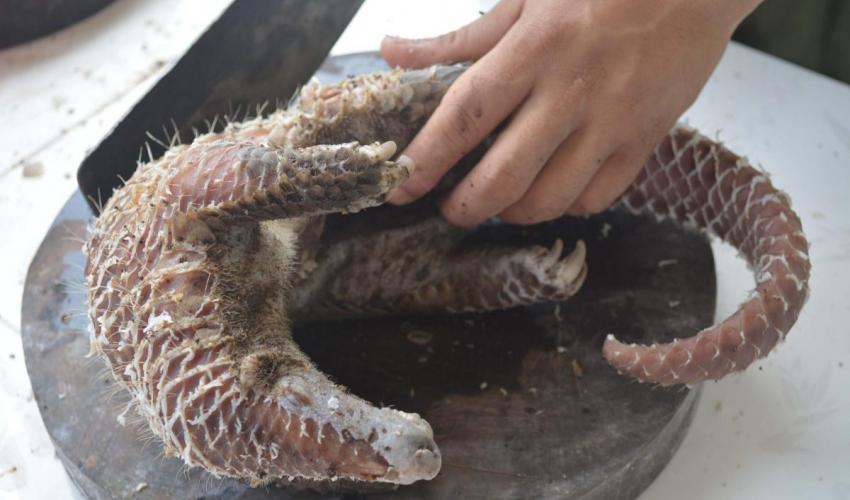First published on 11/14/2016, and last updated on 06/14/2017
Poaching for illegal wildlife trade is a major focus of current conservation and policy development. Poaching and associated illegal wildlife trade in Southeast Asia and the Lower Mekong Region in particular is devastating populations of iconic wildlife species such as tigers and pangolins, and causing severe declines of other wild cats and primates, bears, reptiles, sharks, rays, and pangolins, as well as a host of lesser known commercially valuable plants and tree species. Increasingly organised poaching, with involvement of criminal syndicates, is causing threats to personal security and the natural assets and livelihoods of rural communities that depend on natural resources. While the global and regional policy response has intensified, there is an acute need for the engagement, rights, interests and livelihoods of Indigenous Peoples and rural communities to be integrated into these responses.
The emphasis in most policy debates and conservation spending, both globally and in this region, is strengthening “top-down” (State- or sometimes private-led) law enforcement, and on changing consumer behaviour to reduce demand for illegal wildlife species. These responses often inadequately consider the significant impacts of illegal wildlife trade (and enforcement-based approaches to tackling it) on indigenous peoples and local communities who live alongside the threatened wildlife, and their contributions to combating it. Indigenous peoples and local communities can be severely affected by insecurity and the depletion of important livelihood and economic assets. They can also be affected by heavy-handed responses to wildlife crime, which frequently make little distinction between the illegal activities driven by large scale profits (crimes of greed) versus those driven by poverty (crimes of need). Indigenous women and children are particularly vulnerable to and negatively impacted by such interventions.
However, it is likely that the long-term survival of many wildlife populations and the safeguarding of wild resources that form part of community assets will depend to a large extent on successful engagement of indigenous peoples and local communities as active partners in combating illegal wildlife trade. Over the last few years, there has been an increasing number of policy commitments calling for engaging indigenous peoples and local communities in conservation and enhancing sustainable livelihoods. However, these commitments typically remain vague, with implementation often weak and under-resourced.
Since mid-2014, IUCN (led by IUCN CEESP/SSC Sustainable Use and Livelihoods Specialist Group, SULi), TRAFFIC – the wildlife trade monitoring network, and International Institute for Environment and Development (IIED) have collaborated with a range of partners on initiatives to highlight the importance of the role that indigenous peoples and local communities play in conserving wildlife and combating illegal wildlife trade, as well as examining where, when, and how community-level interventions to stop poaching for illegal wildlife trade can be effective.
From 15-16 November 2016, the third in a series of workshops was held in Hanoi, Viet Nam, focusing on Southeast Asia and particularly the Lower Mekong Basin. It was co-convened by IUCN SULi (lead agency) and IUCN Viet Nam (on-ground organisation), TRAFFIC, IIED, and the ICCA Consortium (Indigenous Peoples’ and Community Conserved Territories and Areas Consortium).
The workshop aimed to draw together regional experiences and lessons learned for engaging indigenous peoples and local communities in combating illegal wildlife trade, in order to draw out lessons and insights for effective approaches. The focus of the workshop was on international illegal wildlife trade (i.e., wildlife trade that involves cross-border transactions), and not illegal use of wildlife for local subsistence use or trade.
“In the long term, the future of wildlife depends on the rural communities who live close to it,” said Dr. Rosie Cooney, Chair of the IUCN Sustainable Use and Livelihoods Specialist Group. “Unless these communities are empowered and motivated – by rights and benefits – to protect and conserve wildlife, poaching for illegal wildlife trade is going to continue driving these populations downwards.”
Other ICCA Consortium members in attendance included Tanya Conlu (Southeast Asia Regional Coordinator and Member NTFP-EP), Aman Singh (Member KRAPAVIS), Dilys Roe (Honorary Member), and Holly Jonas (International Policy Coordinator).
The workshop took place just before the Hanoi international Conference on Illegal Wildlife Trade, hosted by the Government of Vietnam (http://iwthanoi.vn/). On 17 November, an IUCN delegation presented findings, conclusions and lessons learned from the workshop to visiting officials, experts and policy makers during a side-event at the Hanoi Conference.
For more information, please contact Rosie Cooney, Tanya Conlu and Holly Jonas
Links:
More information on IUCN SULi’s work on communities and illegal wildlife trade
